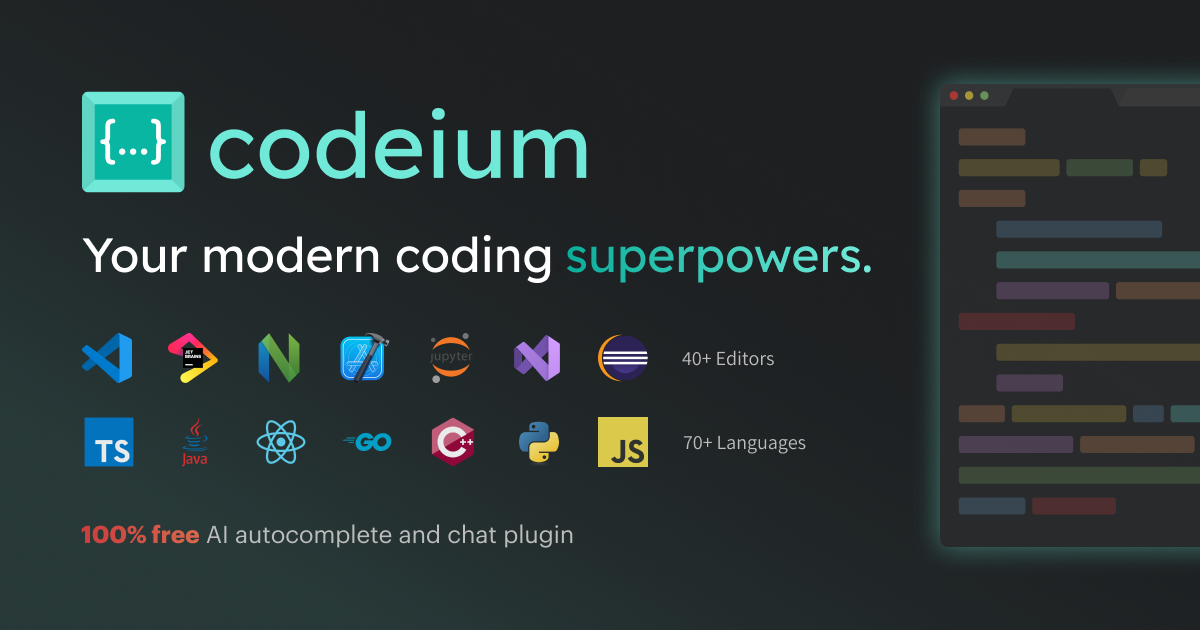- cross-posted to:
- [email protected]
- cross-posted to:
- [email protected]
“The most intelligent AI code generation tool out there and we have the data to prove it.”
been using for a few weeks; it’s quite competitive to copilot only coming shy of supermaven in speed and performance
https://codeium.com/blog/code-assistant-comparison-copilot-tabnine-ghostwriter-codeium
I looked into this previously, and found that there is a major problem for most users in the Terms of Service at https://codeium.com/terms-of-service-individual.
Their agreement talks about “Autocomplete User Content” as meaning the context (i.e. the code you write, when you are using it to auto-complete, that the client sends to them) - so it is implied that this counts as “User Content”.
Then they have terms saying you licence them all your user content:
“By Posting User Content to or via the Service, you grant Exafunction a worldwide, non-exclusive, irrevocable, royalty-free, fully paid right and license (with the right to sublicense through multiple tiers) to host, store, reproduce, modify for the purpose of formatting for display and transfer User Content, as authorized in these Terms, in each instance whether now known or hereafter developed. You agree to pay all monies owing to any person or entity resulting from Posting your User Content and from Exafunction’s exercise of the license set forth in this Section.”
So in other words, let’s say you write a 1000 line piece of software, and release it under the GPL. Then you decide to trial Codeium, and autocomplete a few tiny things, sending your 1000 lines of code as context.
Then next week, a big corp wants to use your software in their closed source product, and don’t want to comply with the GPL. Exafunction can sell them a licence (“sublicence through multiple tiers”) to allow them to use the software you wrote without complying with the GPL. If it turns out that you used some GPLd code in your codebase (as the GPL allows), and the other developer sues Exafunction for violating the GPL, you have to pay any money owing.
I emailed them about this back in December, and they didn’t respond or change their terms - so they are aware that their terms allow this interpretation.
oh wowwww - that’s gonna be a hard nope then :(
These things cost money to run, so how are they offering it for free? Who’s paying for it? How do they profit from our using it? What’s the catch?
Edit: Someone else here found that the license basically means all the code you write with it becomes theirs. Seems like we found the catch.
Edit: Someone else here found that the license basically means all the code you write with it becomes theirs. Seems like we found the catch.
Bahaha if this is true, then this tool is basically pathetic as it’s almost completely useless.
I’m using GitHub Copilot and haven’t dug into the license. It’s possible I’m technically handing all my code over to Microsoft.
You mean our code?
It’s all just the same shit copy pasted from StackOverflow from 1998 😂
Nice. Another model trained on GPL code.
missed opportunity to name it codeine
Not to mention VSCodium already exists.
Does anyone know what they are doing with context data send to their system? Could only find that the saas version had some audit, but didn’t know that term.
It sounds interesting enough to try it in day to day work, but we can’t use most AI tools so far as it violates our company rules when we send parts of the code base as context.
Really need to speak to our lawyer again about this…
Maybe AI will boost open source development more than commercial development since open source devs don’t have the privacy concerns.
I switched from Copilot to Codeium after only a couple of months of Copilot use - just based on the cost since currently I’m just a hobby coder.
The main difference I’ve noticed is that Codeium doesn’t seem as smart about the local context as Copilot. Copilot would look at how I’m handling promises in a project, and stick to that, whereas Codeium would choose a strategy seemingly at random.
A second, and maybe more telling example, is that I do my accounts using ‘plain text accounting’ in VS Code. This is a very niche approach to accounting software and I imagine is hardly in the training sets at all - there certainly would not be a lot of public domain text accounts in the particular format (BeanCount) I use in public code repositories. Codeium doesn’t make any suggestions for entries as I’m entering transactions, whereas Copilot would see that the account names I’m using are present in another file in the project and suggest them, and very quickly figure out the formatting of transactions and suggest them correctly.
Sounds interesting, I’ve never used copilot and I’m not a programmer by profession (I just write a few scripts here and there for data analysis or experiment control), but I’m interested in checking this out. Has anyone here tried it? I’m worried it’ll get in my way more often than it helps.
I’ve found Codeium pretty handy, especially for boilerplate-y stuff like unit tests, and it can very often “guess” what I’m going after especially if I eg have a TODO comment or something similar where I start completion. Doesn’t always work but doesn’t get in my way either, so overall it’s been a benefit
edit: note that the language you write will likely be a factor. When I tried Codeium with Julia, the results were often pretty meh likely because it’s a more niche language, but with eg Swift it’s been fine
I have been able GPT4 to do some basic scripting, but gpt3.5 did not succeeded anything for me. The first plan with gpt4 is 12bucks a month.
If you only code not often, continue.dev is good alternative plugged to a provider like together (using Llama 3 70b a few times and cost me 0.01$). They also announced a partnership with mistral but didn’t tried it.
The first plan with gpt4 is 12bucks a month.
Gpt-4o (the newest model) is free for a limited number of messages.
I haven’t tested it on programming yet. Have you tried it? How is it?
I messed around with it a little bit. I never used gpt-4 so I can’t say how much better it is, but it worked really well and only required some minor tweaking on my part.
Thanks for your inputs <3
I’ve used it with Python for data extraction and visualization last week. It worked worked surprisingly well 90% of the time. But when it failed to produce the code I wanted, it was difficult to trouble shoot and find a way around.
It helped a lot to break the tasks down as much as possible. It also remembered stylistic guidelines from several prompts ago
I’ve been using https://tabby.tabbyml.com/
It’s useful maybe 5-10% of the time, more so if you write comments so basic they are pointless for humans. Seems pretty dumb about the project context.
Just want to chime in that I’ve seen TabbyML used a fair bit at work. Tabby in particular can run locally on M1/M2/M3 and uses the Neural Engine via CoreML. The performance hit isn’t noticeable at all and most of what we use it for (large autocompletes in serialized formats) it excels at.
Someone suggested I try Supermaven yesterday, it’s got some good benefits over competitors. It has a 300,000 token context length so it can send a very large amount of context for your completions, and it has an extremely fast API response time (usually less than 200ms) so completions appear near-instantly as you’re typing.
It’s the first “copilot-like” tool I’ve used, and I’ve only been using it for a day, but so far I’m liking it. And I’ve already signed up for the $10/month pro plan.
after some trial and error and time, this is what I actually use as well personally, it’s vastly superior in speed and context. I second this recommendation!
How big is the context window for the free version? I haven’t found any information about it.
yea they don’t seem to mention it anywhere :/










